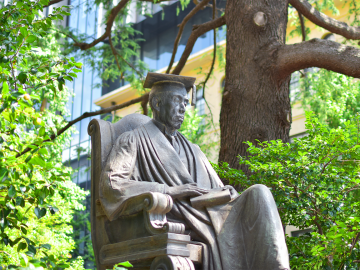Penal Code Amendment Pertaining to Sexual Offenses
Waseda Law School Professor
Kayoko Kitagawa
(Written on January 23, 2018)
1. On June 16, 2017, in the 193rd session of the National Diet of Japan, a partial amendment (Act No. 72 of 2017) to the Penal Code, pertaining to sexual offenses, was adopted. It was subsequently enacted on July 13, 2017.
This amendment greatly changed the former penal regulations on sexual offenses, such as rape, and was the first significant review of sexual offenses since the establishment of the Penal Code in 1907.
In order to carry out preparatory work for the amendment, the government established the Committee for Penal Regulations on Sexual Offenses within the Ministry of Justice in October 2014, and in October 2015 the Minister of Justice consulted with the Legislative Council regarding the outline of the amendment. After undergoing the procedures of deliberations, Legislative Council voting, and reporting to the Minister of Justice, a bill for the amendment was submitted to the National Diet and was passed unanimously by both houses of the Diet.
2. The major accompanying amendments are as follows:
(1) Changes to the actus reus, minimum penalty, and the naming of the crime of rape (Article 177):
・The stipulation that victims of rape be limited to females was changed, and cases where men were subjected to forced sexual intercourse became punishable heavier than forcible indecency (Article 176).
・In addition to the act of vaginal penetration by male genitalia, anal and oral sexual intercourse became heavily punishable.
・Due to these alterations, the name of the crime was changed from “rape” to “forced sexual intercourse.”
・The minimum penalty was raised from three years’ imprisonment to five. Furthermore, the minimum penalty in cases where the victim died or was injured as a result of rape or the like (Article 181, Section 2: Rape Causing Death or Injury) was raised from five years’ imprisonment to six (accompanying this revision, the crimes of gang rape and gang rape causing death or injury were abolished).
・The same change was also added for quasi-rape (Article 178, Section 2), in which a person takes advantage of another person by causing loss of consciousness or inability to resist.
(2) The establishment of a new crime involving intercourse by a guardian (Article 179, Section 1) and indecency by a guardian (Article 179, Section 2):
・Cases where a guardian who has actual custody of a child takes advantage of his/her position of power and has intercourse with a child under the age of 18 are regarded as a new type of crime and are treated similarly to the crime of forced sexual intercourse.
・Cases where a guardian takes advantage of his/her position of power and subjects a child under the age of 18 to an act of indecency are also treated similarly to the crime of forcible indecency.
(3) Amendment to the crime of rape at the scene of a robbery (Article 241):
・The stipulation of robbers being punished particularly heavily in cases where they also committed rape was changed, and cases of rapists committing robbery were treated equivalently.
(4) Making all sexual offenses a crime that is prosecutable without a victim complaint:
・The stipulation that victims of rape and forced indecency were required to press charges themselves was revised, enabling criminals to be prosecuted without victims having to press charges.
3. The government also decided to review the actual circumstances of sexual offenses and the state of enforcement of the amendment, and so forth, three years after the amendment’s enactment, and to take the required measures if adopting countermeasures in line with the actual state of crimes was deemed necessary.



